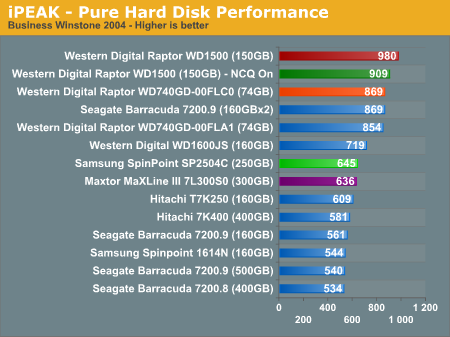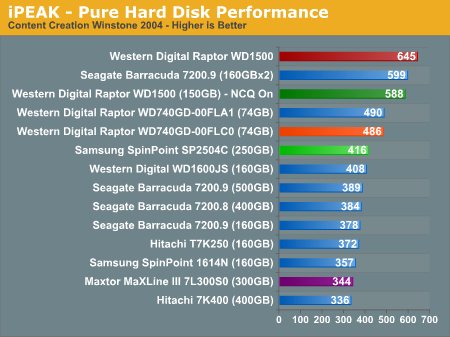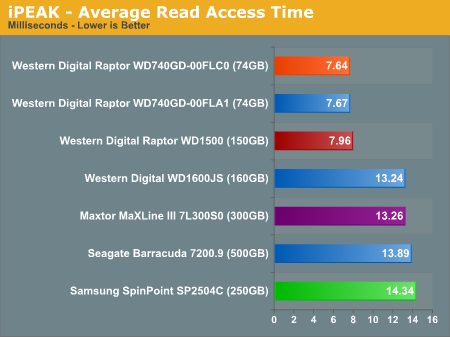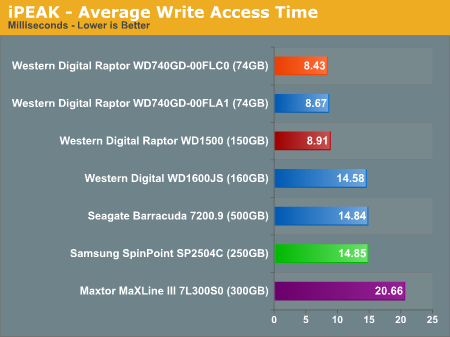Western Digital WD1500ADFD: King Raptor
by Gary Key on February 8, 2006 1:30 AM EST- Posted in
- Storage
Hard Disk Performance: iPEAK
We played back Anand's raw files that recorded I/O operations when running a real world benchmark - the entire Winstone 2004 suite. Intel's iPEAK utility was then used to play back the trace file of all I/O operations that took place during a single run of Business Winstone 2004 and MCC Winstone 2004. The drive was formatted before each test run and a composite average of 3 tests on each drive was tabulated in order to ensure consistency in the benchmark.
iPeak gives a mean service time in milliseconds; in other words, the average time that each drive took to fulfill each I/O operation. In order to make the data more understandable, we report the scores as an average number of I/O operations per second so that higher scores translate into better performance.
The performance of the Raptor WD1500 is extremely impressive and represents a 13% increase over the Raptor 740GD in the Business Winstone test and an incredible 33% increase in the Content Creation Winstone test. Turning NCQ on results in a hit of 8% in the Business Winstone test and 9% in the Content Creation Winstone test. Although the drive maintains excellent performance with NCQ activated we highly recommend turning it off when used in a single-user environment. While the WD1500 random access times are slightly higher than the Raptor 740GD, the overall performance of this drive is consistently better. The Samsung SP2504C provides excellent results considering the bargain pricing on the drive and leads the Maxtor 7L300S0 in most of the test results.




We played back Anand's raw files that recorded I/O operations when running a real world benchmark - the entire Winstone 2004 suite. Intel's iPEAK utility was then used to play back the trace file of all I/O operations that took place during a single run of Business Winstone 2004 and MCC Winstone 2004. The drive was formatted before each test run and a composite average of 3 tests on each drive was tabulated in order to ensure consistency in the benchmark.
iPeak gives a mean service time in milliseconds; in other words, the average time that each drive took to fulfill each I/O operation. In order to make the data more understandable, we report the scores as an average number of I/O operations per second so that higher scores translate into better performance.
The performance of the Raptor WD1500 is extremely impressive and represents a 13% increase over the Raptor 740GD in the Business Winstone test and an incredible 33% increase in the Content Creation Winstone test. Turning NCQ on results in a hit of 8% in the Business Winstone test and 9% in the Content Creation Winstone test. Although the drive maintains excellent performance with NCQ activated we highly recommend turning it off when used in a single-user environment. While the WD1500 random access times are slightly higher than the Raptor 740GD, the overall performance of this drive is consistently better. The Samsung SP2504C provides excellent results considering the bargain pricing on the drive and leads the Maxtor 7L300S0 in most of the test results.










51 Comments
View All Comments
shady28 - Sunday, April 9, 2006 - link
Kinda bogus review here. How on earth can you put a SATA drive in comparison to other SATA drives, then draw conclusions about SATA vs SCSI?? The answer is you can't, especially in regards to SATA being 'ready' for use in big fileservers. It's a cheap alternative to SCSI, not a performance alternative. Check the link below for fileserver iometer (IOPs) benchmarks of many different drives, and you'll find that the top SCSI drives demolish the top SATA drives with nearly double the IOPs ratings :
http://www.storagereview.com/comparison.html">http://www.storagereview.com/comparison.html
Kensei - Friday, February 10, 2006 - link
I've said it before but I'll say it again... Gary sets the standard for technical writing excellence. His work should be studied closely by all who aspire to do this type of work. I hope you're at least 26 or older becasue if you're writing like this at 19, 20 or 21, I think I'm going to get sick... with jealousy.Kensei
SpecOps - Friday, February 10, 2006 - link
I would have liked to see the "value Raptor" in the tests as well, so we can get a better picture of price vs. performance.Gary Key - Friday, February 10, 2006 - link
I will see if we can get a WD4000 series and update the article or at least have it for the RAID follow up. We have the new WD 500GB drive to test also.JustAnAverageGuy - Thursday, February 9, 2006 - link
Good article Gary, look forward to more in the future.One of the few editors who actually reads and replies to more than just one or two comments. :thumbsup;
- JaAG
CrystalBay - Wednesday, February 8, 2006 - link
Gary , you have a very proficient writing ability . I noticed it on your first review at AT keep up the good work...MadAd - Wednesday, February 8, 2006 - link
I just checked and prices for these in the UK is £210 - its almost the price of a scsi drive ffs (a 147gig hitachi u320 is only £50 more).
Im not quite sure what market segment these are aimed at, I just hope they dont shoot themselves in the foot being priced so close.
yacoub - Wednesday, February 8, 2006 - link
Gary - Thanks for this excellent review and for addressing the two primary complaints I had with the last harddrive review here: The old Samsung drives listed and lack of SP2405C and the tiny decibel test graph that was hard to read and draw conclusions from.This test has a great lineup of drives tested and much better graphs. Very nicely done!
Gary Key - Thursday, February 9, 2006 - link
Thank you and actually everyone for the comments. We have certainly listened to the requests and hopefully our improvements over the course of the next few articles will be satisfactory for everyone.
Although I have had some personal issues with Samung drives in the past I have to give them credit for producing a very good drive in the SP2504c. It would be my drive of choice in a HTPC or SFF setup at this time if you need a silent drive. The performance of the drive is competitive with others in its class for the most part at a very good price point. I tested the drive last night in a sound enclosure and there was only a 5 decibel difference between idle and constant read/write operations. I believe some of the additional decibel readings in the article is our equipment picking up noise from the drive cage. We will continue to refine this process for testing but the readings we reported were very consistent given the environmental conditions in the test room.
Jeff7181 - Wednesday, February 8, 2006 - link
I agree with those that say a Part 2 with RAID testing would be interesting.